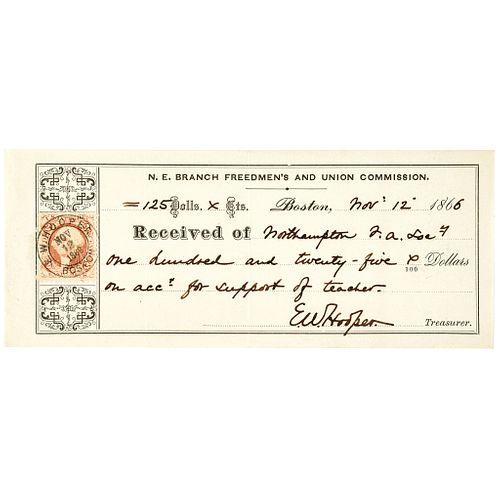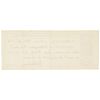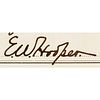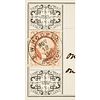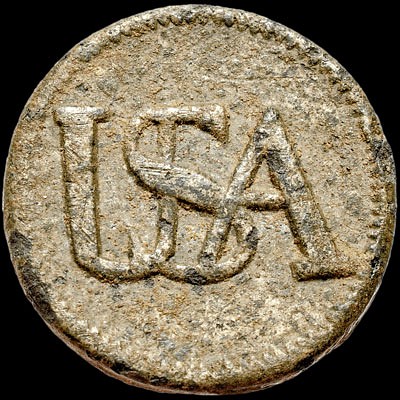1866 Captain Edward William Hooper Signed Partly-Printed Receipt
Lot 16
Estimate:
$180 - $240
Absentee vs Live bid
Two ways to bid:
- Leave a max absentee bid and the platform will bid on your behalf up to your maximum bid during the live auction.
- Bid live during the auction and your bids will be submitted real-time to the auctioneer.
Bid Increments
| Price | Bid Increment |
|---|---|
| $0 | $10 |
| $200 | $20 |
| $300 | $25 |
| $500 | $50 |
| $1,000 | $100 |
| $2,000 | $200 |
| $3,000 | $250 |
| $5,000 | $500 |
| $10,000 | $1,000 |
| $20,000 | $2,000 |
| $30,000 | $2,500 |
| $50,000 | $5,000 |
| $100,000 | $10,000 |
| $200,000 | $20,000 |
| $300,000 | $25,000 |
| $500,000 | $50,000 |
About Auction
By Early American History Auctions
Aug 21, 2021
Set Reminder
2021-08-21 12:00:00
2021-08-21 12:00:00
America/New_York
Bidsquare
Bidsquare : Autographs - Historic & Political Americana - Militaria & Guns
https://www.bidsquare.com/auctions/early-american-history-auctions/autographs---historic-political-americana---militaria-guns-7321
335 Lots of Rare, Historic Autographs, Americana, Civil War Era, George Washington, Revolutionary War Era, Colonial America, Federal Period, War of 1812, Colonial Currency & more... Early American History Auctions auctions@earlyamerican.com
335 Lots of Rare, Historic Autographs, Americana, Civil War Era, George Washington, Revolutionary War Era, Colonial America, Federal Period, War of 1812, Colonial Currency & more... Early American History Auctions auctions@earlyamerican.com
- Lot Description
Autographs
Captain Edward William Hooper Partly-Printed Receipt
EDWARD WILLIAM HOOPER (1839-1901). Aide-de-camp on the staff of Union Generals Rufus Saxton, Department of the South and John Adams Dix, Department of the East during the American Civil War from 1862 to 1865. Post Commander and Military Governor in the South Carolina Sea Islands.
November 12, 1866-Dated, Partly-Printed Payment Receipt measuring about 2-7/8" x 7", Signed "E.W. Hooper" as Treasurer of the N.E. Branch Freedmen's and Union Commission, Boston, [MA], Choice Extremely Fine. Shows the receipt of $125 "on acct for support of teacher" from the Northampton Society. Two faint vertical folds, one at Hooper's signature. Of particular interest is the 2-Cent Internal Revenue Bank Check Stamp affixed at left with a round-dated cancellation stamp dated Nov 12, 1886 / Boston, of "E.W. Hooper".
Captain Edward William Hooper (1839-1901), known as E. W. Hooper and also colloquially as Ned, was Aide-de-camp on the staff of Union Generals Rufus Saxton, Department of the South and John Adams Dix, Department of the East during the American Civil War from 1862 to 1865.
Hooper also served as private secretary to General Saxton, during which time he was given the rank of Captain. He was also Post Commander and Military Governor in the South Carolina Sea Islands. Subsequently, he became steward (from 1872 to 1874) and later treasurer (from 1876 to 1898) of Harvard College. Early in the Civil War he enlisted in the army, serving on the staffs of Generals Saxton and Dix. He was sent to Port Royal, South Carolina in March 1862 as part of a contingent of teachers & school administrators from the New England Freedmen's Aid Society, of which his father was vice-president.
He served on the staff of Gen. Saxton in the Department of the South as a Captain from March 13, 1865. He later served on Gen. Dix's staff in the Department of the East in New York and was given a promotion to Brevet Major on Jan 15, 1866.
After the war, Hooper returned to Boston opened an office and lived in Cambridge, Massachusetts at the Hooper-Eliot House, a Stick style house built in 1872 for Hooper. After his retirement, Hooper devoted his time to the care of large trust properties and was one of the original trustees of the Boston Museum of Fine Arts.
- Shipping Info
-
Early American provides in-house worldwide shipping. Please contact us directly if you have questions about your specific shipping requirements.
-
- Buyer's Premium



 EUR
EUR CAD
CAD AUD
AUD GBP
GBP MXN
MXN HKD
HKD CNY
CNY MYR
MYR SEK
SEK SGD
SGD CHF
CHF THB
THB